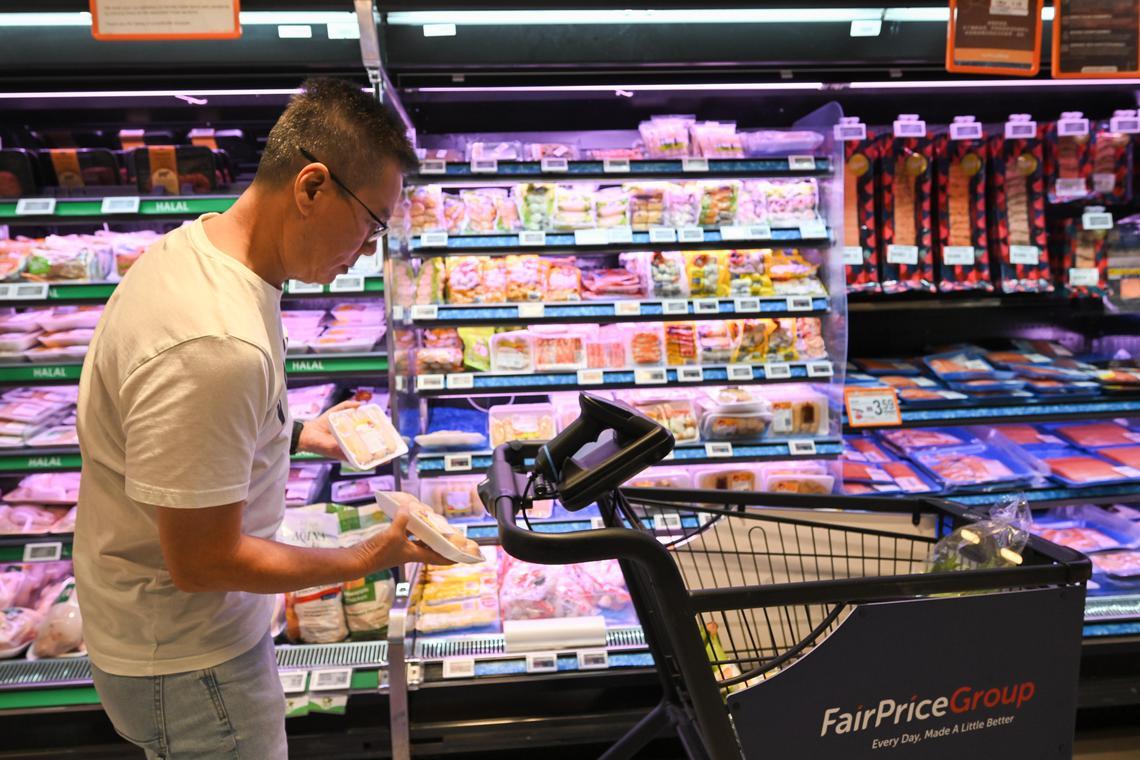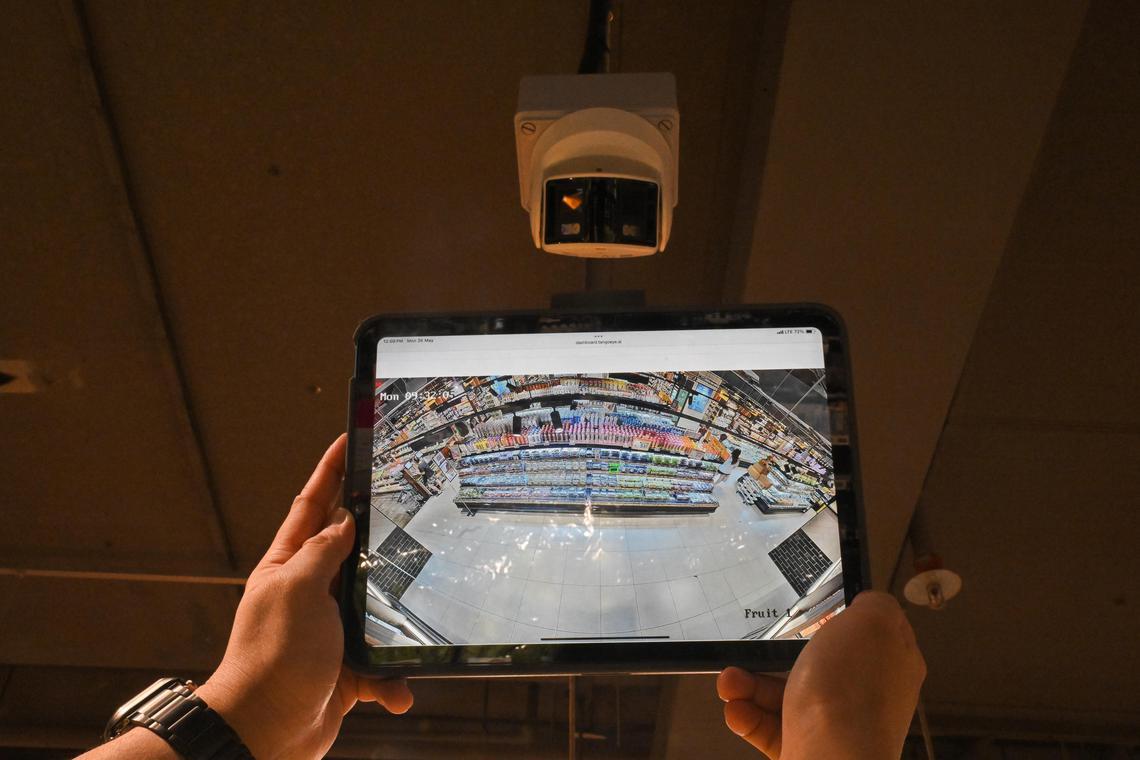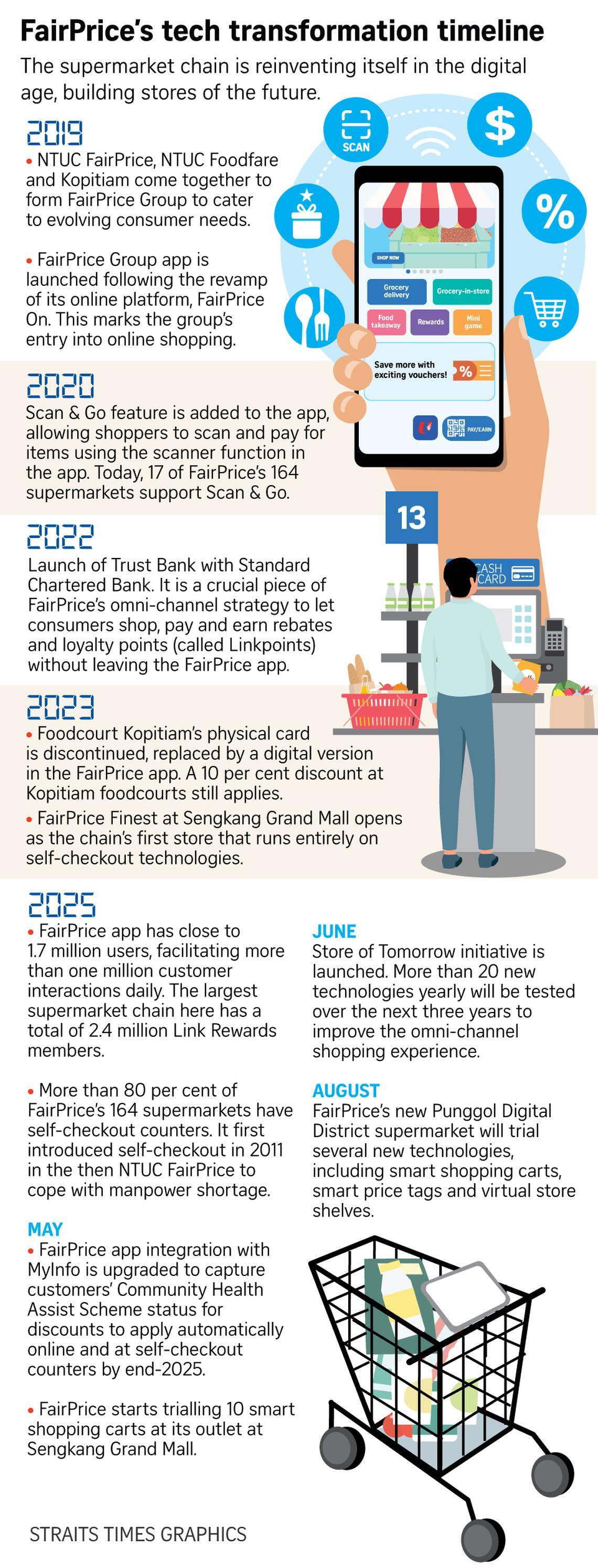FairPrice trials smart trolleys in digital push to create stores of tomorrow

(Photo credit: ST Photo/Shintaro Tay)
Source: The Straits Times
For a few weeks now, some shoppers at FairPrice Finest in Sengkang Grand Mall have been using trolleys mounted with touchscreens and barcode scanners.
The digitally decked-out trolleys offer in-store navigation and personalised recommendations, and let shoppers check out without queueing at cashier counters.
Meet Smart Carts, which began trials in May in the Sengkang outlet.
The trolleys and several other digital in-store fittings are part of a Store of Tomorrow initiative that FairPrice unveiled at the National Retail Federation’s Big Show Asia Pacific 2025, which is being held at the Sands Expo and Convention Centre from June 3 to 5.
Mr Vipul Chawla, FairPrice Group chief executive, told The Straits Times that a budget “in the millions” has been allocated to pilot more than 20 new technologies annually over the next three years till 2028 to enhance the supermarket’s omnichannel shopping experience.
The budget also covers recently hired software engineers and data scientists as it seeks to reinvent itself digitally to deepen its engagement of millions of shoppers in Singapore.
“In 2022, the management team and I looked at where the points of friction were. Then we worked it back-to-front to see how we could use technology and training to make the whole interaction seamless,” said Mr Chawla, who succeeded Mr Seah Kian Peng to helm Singapore’s largest supermarket chain that year.
Processes earmarked for change include store navigation, promotion alerts, product recommendation and payment.
Many of FairPrice’s 164 supermarkets currently feature self-checkout counters, the Scan & Go function on the FairPrice app, as well as ample signage to guide shoppers to promotion items and store sections.
Still, staff often spend time giving directions to customers and verifying Community Health Assist Scheme (Chas) cards for discounts. Customers also often inquire about items on promotion while standing in line at payment counters. These tasks are manual and time-consuming.
“Shopping is as much an experience as it is a transaction. We can make that experience more fun, engaging and interactive,” Mr Chawla said.
Come August, when FairPrice opens its latest supermarket in Punggol Digital District, it will test the Smart Carts on a larger scale compared with the 10 trolleys currently on trial in its Sengkang outlet.
Digital price and promotion labels and smart store cameras will also be featured in the new supermarket to improve the shopping experience.
Smart trolleys are being used by an increasing number of overseas grocery retailers, including Amazon, Walmart and Kroger. Many provide similar functions, including payment processing.
To use the FairPrice Smart Carts, shoppers must unlock them with the Pay/Earn QR code on their FairPrice app. The cart’s display is personalised, as the system has access to the user’s past purchases to provide product recommendations and promotion alerts.
A search feature on the trolley’s touchscreen – complete with an in-store map and navigation instructions – helps shoppers to find what they are looking for. Sensors in the cart detect items on offer as shoppers browse the aisles and flash the promotion on screen.
Shoppers can use the built-in scanner on the trolley’s handle bar to add items before putting them in the trolley, which has a weight sensor to tally the goods. Checkout is done by tapping the touchscreen and the purchases are reflected on the FairPrice app.
If the weight of the item added to the trolley does not match what was just scanned, a light sensor on the cart will flash orange to alert staff, who will conduct random checks when customers return the trolleys.
“This is well beyond self-checkout. Your whole shopping is done in your own shopping cart,” said Mr Chawla, noting that FairPrice’s self-checkout services islandwide now process more than half of total store transactions.
Civil servant Phua Cheng Hua, 60, who frequents the Sengkang outlet, likes the convenience of the Smart Carts. “This saves me a lot of time by eliminating the need to queue for payment,” he said.
For added convenience, FairPrice is urging customers to update their profile on the app following an upgraded integration with MyInfo, the Government’s data vault on citizens and permanent residents.
This will allow the app to capture shoppers’ Chas card details for discounts to be automatically applied for online purchases and at self-checkout counters. This automation will be live by the end of 2025.
Without the MyInfo profile update, Chas discounts can be applied only at cashier-manned counters as card verification is needed.
“With the MyInfo profile update, you don’t have to worry about which day to use which card if your family has several of them. The system will do the thinking and apply the appropriate card,” said Mr Chawla.
Also coming are in-store digital promotion and price labels. These are becoming increasingly common among grocery retailers as they free up the time that staff spend on printing and changing physical labels.
FairPrice plans to roll out digital labels across its 164 supermarkets over the next 36 months if the pilot in Punggol Digital District is successful.
As store space is limited, an Endless Aisle experiment will let store shoppers scan a QR code on electronic shelf labels to be directed to a full catalogue on the FairPrice app. Consumers can complete their purchases and schedule a delivery on the app.
Existing in-store CCTV cameras will also be upgraded with video analytics to alert staff when items on shelves need replenishing, more registers have to be opened to manage long queues, or liquid spills require clean-up.

Commenting on unmanned “just walk-out” stores that were hailed as the future of retail, Mr Chawla said: “There’s no warmth.”
The unmanned format works only for convenience stores, similar to some of FairPrice’s Cheers outlets in certain places such as universities and the armed forces, he added.
Even as FairPrice tries out digital tools islandwide, the retailer is mindful of its social mission not to leave anyone behind. Its staff – many of whom are middle-aged or elderly – have undergone training to help customers who might have dementia, or serve as digital ambassadors.
“So the nature of the work changes a little bit, but hopefully the customer experience becomes less clunky,” said Mr Chawla. “Seven in 10 Singaporeans still like to visit a physical store.”

